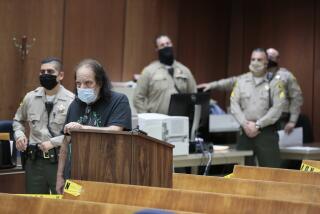Victim confronts rapist in L.A. court before his sentencing
For 11 years, Jane Piper searched for ways to put back the life that unraveled when a stranger raped her.
She tried therapy. She left L.A. for a fresh start in Canada. She dreamed that her rapist’s capture would bring peace.
But she still didn’t feel any lasting comfort, even when authorities caught the man who raped her in a Ralphs supermarket parking lot in Brentwood.
The same question always remained: Why did this man attack me?
On Tuesday, Piper closed her eyes, let out a long breath and whispered, “I’m ready,” before she walked slowly to a witness box inside the Airport courthouse and looked at the man who had upended her life. She was ready to finally ask him.
While victims have a right to address a judge at a sentencing hearing about how a crime affected their lives, confronting attackers in court is unusual in rape cases, said Carol Burke, who heads the Los Angeles County district attorney’s office’s sex crimes division. Her office encourages victims to try, she said, knowing that doing so has provided a sense of personal justice for some, but many victims say no.
“The nature of sex crimes cases is that this is a huge, life-changing event,” Burke said. “It’s a stressful thing. Most victims are glad the process is over.”
While The Times does not typically name victims in sexual assault cases, Piper asked to be identified, saying that it shows she’s not ashamed of what happened to her and that other victims shouldn’t be either. She also feels a responsibility as a victim, she said, to add her voice to a conversation often dominated by people several steps removed from the crime.
“We hear a lot about rape,” she said before Tuesday’s hearing. “But not from victims.… I want people to hear that I survived and it’s OK to talk about this thing.”
In 2003, Piper, then 32, was working as a personal assistant for a television producer when she had to buy groceries for her boss. It was her father’s birthday, and she wanted to finish the shopping so she would have time to call him.
She walked out of the Ralphs supermarket at Wilshire Boulevard and Bundy Drive, loaded groceries into the trunk of her boss’ charcoal-colored Suburban and hopped behind the steering wheel to rearrange some bags on the passenger seat. When she turned around, she saw a man standing in the vehicle’s doorway with a corkscrew. He pressed it into her rib cage and shoved her off the seat. He locked the doors. She burst into tears.
He wouldn’t hurt her, he said, but pointed toward the back seat, where the windows were tinted. When she tried to escape, he got mad and flashed the corkscrew at her. Then he ordered her to take off her clothes.
Piper grabbed the corkscrew from his hand and tried to jump back into the middle seat, but he pulled her back and started to punch her in the head. She watched her blood spray in front of her face.
“He was going to kill me,” she said. “So that’s what I did — I just checked out physically.”
Piper used her finger to write “help” in the fogged-up back window, but nobody came. The attack continued for half an hour. When he stopped and headed for the driver’s seat, she fumbled for the back door’s buttons and managed to lower one of the windows. She jumped out and ran toward Ralphs to ask for help. The attacker peeled off in her boss’ Suburban.
Police interviewed dozens of people and took a composite sketch of the assailant around the neighborhood, but the case went cold.
It took nine years before authorities were able to match DNA from the attacker to a suspect. In 2012, Gilbert Trejo, now 58, was charged with the rape. He pleaded to carjacking and rape, avoiding a trial.
For a few years after the attack, Piper regularly suffered flashbacks of the rape. Turning around to see a valet driver standing outside her car door made her shake. Eventually the details of that day felt more distant, she said, but the emotional damage deepened. She had difficulty making new relationships or maintaining old ones.
“I became a disgusting, impossible person to be around,” she said. “No one was good enough to stay in my life.”
When Piper and Trejo locked eyes in the courtroom Tuesday, he made no expression. But as she began to talk, a slight smile cracked his face.
She compared the rape to a hurricane — a half-hour that left her life in pieces.
He tapped his right foot and blinked as he listened to her questions. Did he remember what he did to her in that car? Had he done it to anyone else? Why? Was he sorry he did it, or was he sorry that he got caught? Was he sorry at all?
She said she had killed a trail of ants in her hotel bathroom Monday night without thinking twice. Was she like an ant that he’d crushed without thinking, she asked? That would be disturbing, she said, but she’d like to know.
“How much of what you did to me did you carry with you over the years?” she asked.
Trejo broke eye contact and looked away. Then she started to say something that surprised even her.
“I forgive you,” she said. “I’ve got to forgive you, OK? I wanted to say this and I’m actually feeling it.”
She smiled and asked a few more questions. Then she stopped talking, waiting to see whether he would respond. His slow cadence broke the silence.
“I don’t remember me doing any of these things,” he said. “I’m not that type of person — never have been and never will be.”
Piper nodded, but told him that deep down she thought that he did remember.
“I know that it happened,” he said. “But I do not remember why or when.”
Trejo’s attorney cut him off and objected to him saying anything more. Piper left the witness stand, but she thanked Trejo first. She told him she felt he had truly listened.
Superior Court Judge Elden S. Fox sentenced Trejo to 20 years in prison.
On her way out of the courtroom, Piper spotted a detective who had worked on the case 11 years earlier and gave him a hug.
“It worked out, huh?” she said, smiling. He nodded.
Outside the courthouse, Piper said that she was surprised by how well her experience in the courtroom had gone and that she felt unburdened. She said she could finally focus on helping others rather than fixing herself. She could finally let go of the idea that she needed to do more to heal.
“Even just yesterday, even this morning, I was holding on to it,” she said. “I literally left it in that courtroom. And now it’s done. It’s over.”
Twitter: @marisagerber
More to Read
Start your day right
Sign up for Essential California for news, features and recommendations from the L.A. Times and beyond in your inbox six days a week.
You may occasionally receive promotional content from the Los Angeles Times.







